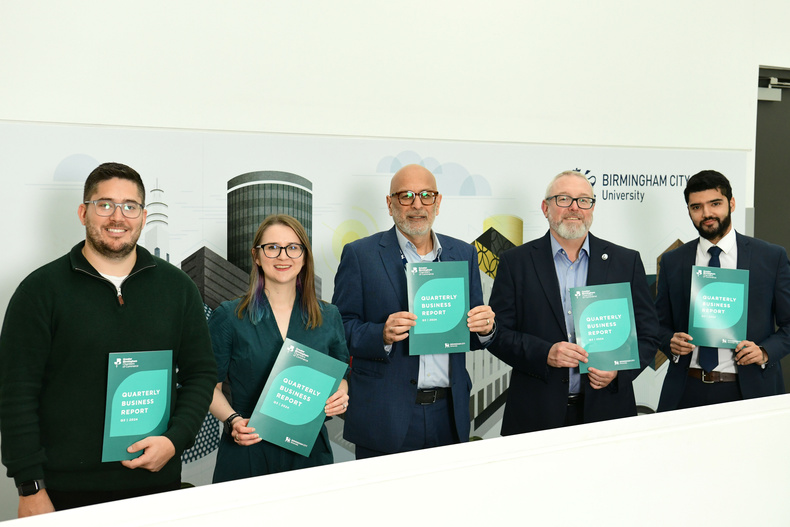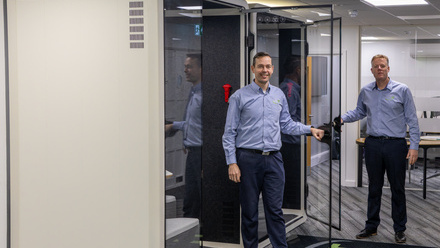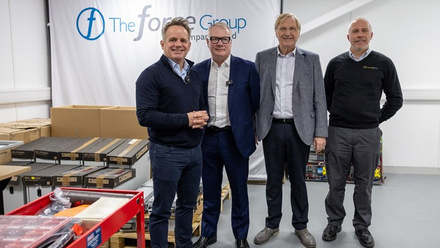AI technology talked upon at Chamber's QBR launch

The use of AI as a business tool was the highlight of yesterday’s launch event for Greater Birmingham Chambers of Commerce’s latest Quarterly Business Report.
The event, sponsored by and held at Birmingham City University (BCU), was chaired by Greater Birmingham Chambers of Commerce CEO Henrietta Brealey.
The Quarterly Business Report (QBR) is the most comprehensive of its kind in the city-region, offering an up-to-date snapshot of the performance of the Greater Birmingham business community.
Professor Harris Beider, pro vice-chancellor of engagement, enterprise, and innovation at BCU started off the event by shining a spotlight on the importance of universities for helping students of the AI and technology sectors to stay in Birmingham after their education to help drive growth within these sectors in the West Midlands.
He said: “Fifty thousand AI professionals work in the UK, and the UK AI market is worth 16.9 billion pounds. If you break that down into Birmingham, it means that the West Midlands is one of the growth markets here and is one of the fastest growing markets in tech in the UK and the top region for foreign direct investment.
“The ambition is that for the region AI could create up to 500, 000 jobs in the UK by 2030, mainly in data science, machine learning, and AI ethics. But you need people who have got the skills and capability to fill those jobs.
“For BCU, AI is going to be central to our plans. Thirty thousand students, three thousand members of staff, we are a 350-million-pound business. 71 percent of our students come from minority backgrounds, one out of two from the poorest parts of the city region. There's a sort of stickability here, and our students who graduate after their degrees will stay in the area.
“Therefore with that diverse pipeline, which is really important for us, we need to make sure that the jobs that are created in AI and tech are the ones that our students can apply for and secure, because that would be a transformation experience.”
He also highlighted how there are twice the number of AI businesses in the UK compared to the rest of the world, and how important it is for the younger generation to “have a seat at the table” of the AI and technology sectors within businesses.
Raj Kandola, director of external affairs at the GBCC, followed by highlighting the key areas of the findings of the QBR, including domestic demand, export demand, workforce and recruitment, price pressures and external factors.
Q3 saw a slight fall in domestic demand, with 40 per cent of businesses reporting growth in their domestic sales, compared to 44 per cent in Q2. Export growth continues to struggle to keep pace with domestic growth, with 27 per cent of firms reporting having increased their export sales volumes over the last three months, which is the same figure as the previous quarter.
Workforce headcount trends have remained largely stable since the last quarter, with 30 per cent of businesses seeing an increase in employee numbers (up from 29 per cent in Q2).
The price pressures that businesses have been facing for some time have not showed signs of easing throughout Q3, with 43 per cent of respondents expecting the price of their goods or services to increase over the next three months.
The event also featured expert speakers on AI and technology, including Phil Webb, co-founder at Vu AI Limited, and Lee Doughty, director of Security and AI Practice at Intercity Technology Ltd.
Phil spoke about the importance of AI for SMEs, adding: “One in six UK businesses are already using AI. SMEs are at risk of being left behind if they don’t start using AI, because their competitors will.
“There is less red tape for SMEs, so they can make their decisions quicker, they can implement it quicker. Generally, they have more personal data for their systems and this means they can use it in a better way.”
He also spoke about the importance of due diligence when choosing AI programmes to use, highlighting how different programmes can either collect your data and store it, or just use it for the task you are asking it to perform.
He warned how those who process personal data, such as medical professionals, need to be wary when selecting their programme to remain within ethical parameters.
Lee Doughty spoke about Intercity’s journey with using AI, saying: “We are a technology company, we want to embrace technology, we want to be at the forefront of technology, so it was a no brainer for us to invest in AI.
“But the first thing that struck us, and I’m sure it has struck everyone, is it is a really crowded place out there. It is really hard to write businesses cases for this stuff, you basically have to take a non-traditional approach and take the plunge. Start off small and learn as you go.”
He also highlighted the importance of making sure employees are comfortable with using the technology, and how AI “is not about replacing staff, it is about enabling them to do more.”
He said: “Your staff are the ones that know the business intimately, they are the ones that are going to generate ideas about where you need to apply AI, the different opportunities that are out there, and how they can improve their own working practices.
“Ensuring that your staff are well informed and are not frightened of this technology is key. Make sure that they can use it, let them play with the technology so they know how. I encourage you to have education and awareness programmes in your business around AI, it is about breaking down barriers and the mystery around AI.”
Click here to read the full Q3 Quarterly Business Report.
Pictured (L-R): Phil Webb, Henrietta Brealey, Prof Harris Beider, Lee Doughty and Raj Kandola



